
Written by Kristen Lopez
British cinema has a style, a feeling all its own, which is why some of the world’s greatest actors and actresses hail from the land of our past oppressors (I say that with love, of course!). With that being said, it’s great to look back at certain British films and see our top actors back when they were just beginning, as is the case with Twilight Time’s recent Blu-ray release of 1987’s A Month in the Country. A quiet, meditative film, A Month in the Country gave us the acting debuts of both Kenneth Branagh and Colin Firth, playing roles they would hone in subsequent movies. Along with the likes of Natasha Richardson, A Month in the Country’s languid tribute to art, religion, and post-WWII rehabilitation, Twilight Time gives us a great actors showcase in a stunning package.
In the town of Oxgodby, Yorkshire, a recovering soldier named Birkin (Firth) arrives with the intent of uncovering a painting in the local church. As he works, he becomes enraptured with the lives of the town’s residents, including an ebullient archeologist (Branagh) and the angelic vicar’s wife (Richardson).
Unlike the work of Merchant/Ivory, A Month in the Country plays like a BBC production you’d find on PBS, and that’s because it started out with the intention of being one. Despite its small-time origins, the film moves beyond its humble introduction with an emphasis on details. The cast is small, accurately depicting a small-town atmosphere where everyone knows each other’s business (or needs to get in on it). Birkin’s arrival brings out the requisite looky-loos, led by the the station master’s two precocious children, and from there he learns how to interact with people again. The various situations are familiar: war-torn man goes to a local village where he finds himself, but the acting and beautiful location work keep things fresh.
Much of that is because Birkin is surrounded by natural beauty, whether it’s the gorgous, verdant forests he wakes up to every morning or the simple beauty of Natasha Richardson in a summer hat. Birkin is a man ravaged by war and memories of an event we’re never fully aware of, turning us into those same town looky-loos. As Birkin uncovers the painting, uncovering what was there before, the audience must uncover the town itself. There isn’t any murder mystery or shocking melodrama like you’d expect from this type of narrative. Director Pat O’Connor is more interested in immersing us in a way of life, of getting a brief glimpse into people’s lives. In that regard, we learn about what came before the town, and how life (or a painting) has been changed by war, religion, etc.
Before he won an Academy Award for playing a shy man with a stutter, Colin Firth played Tom Birkin…a shy man with a stutter. The stutter isn’t an overwhelming impediment Birkin must surpass like it was in The King’s Speech, but it does define him as a broken man. As he becomes friendlier with the town’s inhabitants, he’s able to shrug off the horrific aftermath of the war that’s manifested in nightmares and the stutter. You know of his growing crush on Richardson’s Alice because it’s the one moment where his stutter returns.
Birkin’s role as omniscient observer grounds the audience and also puts him in a similar religious conundrum as the town. The vicar is against the painting being restored, as he feels it would take away from the importance of his sermons. Yet he fails to take into account how much artwork is inspired through religion and, in fact, what Birkin uncovers goes right along with the fire and brimstone message of one half of the religious faction arguing in the film. Parenthetically, Birkin is almost God-like, watching characters from a high church scaffold, sleeping in the belfry a la Quasimodo. He’s contrasted with Branagh’s James Moon, who enjoys sleeping in a fox hole to feel “safe.” This isn’t Branagh’s film, but he’s a great companion character for Birkin. Where Birkin is serious, shy and sensitive, Moon is gregarious; his frivolity, though, belies torments presumably on par with Birkin’s.
As for Twilight Time’s newest Blu-ray, Julie Kirgo’s accompanying essay perfectly sums up why this movie should be seen. To make a long story short, no one could find a print of this for years until fan intervention led to the discovery of a 35 mm copy. So we should appreciate that this movie has a DVD or Blu-ray release at all. There’s some decent bonus features including isolated score, audio commentary and the trailer. But I have to ask why, on these foreign films more than others, there are no subtitles? It’s not that the accents are heavy, but oftentimes it’s hard clarifying everything and the sound mix requires increasing the volume to hear. If you have trouble hearing or can’t navigate accents, the lack of subtitles will cause trouble.
Overall, A Month in the Country is a languid examination of human nature with great performances from Firth and Branagh. With a great mix of artistic and religious discussion, the film is complex.